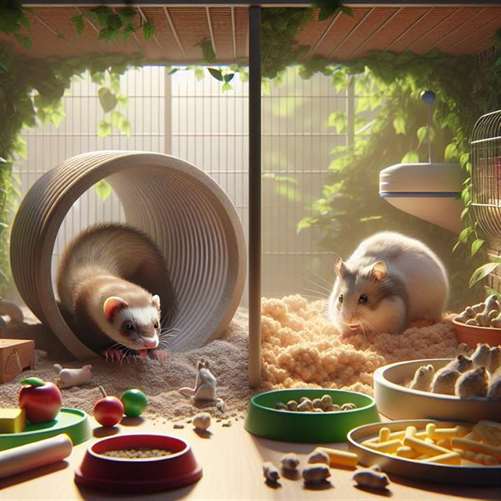Ferrets vs. Hamsters: Which Makes the Better Pet?
Introduction
In recent years, the trend of owning small pets has surged, with many people gravitating towards unique companions like ferrets and hamsters. These little animals not only bring joy but also require specific care that can significantly impact your lifestyle. If you’re pondering the question of ferrets vs. hamsters, you’re not alone. It’s a debate many pet enthusiasts engage in, especially when considering which pet is best suited for their homes and lifestyles.
According to a recent survey by the American Pet Products Association, small mammals have become increasingly popular, with ferrets and hamsters ranking among the top choices. Pet owners are drawn to these animals for their playful natures, relatively compact sizes, and the unique companionship they offer. However, the decision between a ferret and a hamster can be challenging, as both have distinct personalities, care requirements, and living arrangements.
This article will delve into the nitty-gritty of ferrets vs. hamsters, highlighting their care needs, behavioral traits, and the overall commitment required for each. You’ll discover which furry friend might be the perfect fit for your home, whether you’re looking for an active pet that loves to play or a calmer companion that requires less interaction.
By the end of this article, you’ll be equipped to make an informed decision regarding your next pet. So, let’s jump into the fascinating world of ferrets vs. hamsters and see how they stack up against each other!
If you’re interested in exploring the best small pets for families, check out our guide on popular small mammal pets to own.
What is Ferrets vs. Hamsters?
Definition
When we talk about ferrets vs. hamsters, we are essentially comparing two popular small mammals that serve as excellent pets. Ferrets are domesticated relatives of the European polecat and are known for their playful and curious nature. They are social animals, often requiring companionship from humans or other ferrets. On the other hand, hamsters are small rodents that belong to the family Cricetidae. They are typically solitary creatures that prefer a more independent lifestyle.
Historical Context
The domestication of ferrets dates back to around 2,500 years ago. Originally bred for hunting vermin, these animals have since become beloved household pets. The hamster, particularly the Syrian variety, has a more recent history, having been domesticated in the 1930s. Both animals have held significant cultural importance in various societies, often symbolizing companionship and playfulness.
The Importance of Ferrets vs. Hamsters
As the trend of adopting small mammals rises, understanding the differences between ferrets and hamsters becomes crucial. Each species has unique characteristics that cater to different lifestyles and preferences. The choice often comes down to the level of interaction desired, space available, and the time commitment you are willing to make.
Ferrets vs. Hamsters in the Context of Pet Care
In the realm of pet care, both ferrets and hamsters have distinct needs. Ferrets require more space and social engagement, necessitating an environment where they can explore and play. Conversely, hamsters can thrive in smaller cages and are generally lower maintenance, making them suitable for individuals with limited living space.
Key Players or Contributors
The pet care industry is rich with brands and organizations dedicated to the well-being of ferrets and hamsters. From specialized food manufacturers to reputable breeders, various players contribute to the growing knowledge and resources available for pet owners. Organizations like the Ferret Association and the Hamster Club provide valuable information to ensure responsible pet ownership.
To learn more about the essentials of pet care, check out our article on care tips for small mammal pets every owner should know.

How Does Ferrets vs. Hamsters Work?
Understanding the Needs of Ferrets
When it comes to caring for ferrets, it’s essential to understand their unique needs. Ferrets are highly social animals that thrive on interaction, requiring daily playtime and mental stimulation. Here’s what you need to know about their care:
-
Space: Ferrets need ample space to roam and play. A multi-level cage is ideal, providing room for climbing and exploration. When they are out of their cage, ensure a safe area where they can explore without hazards.
-
Social Interaction: These pets are very social and often do best in pairs or groups. They require daily interaction to keep them happy and healthy. If you’re considering a ferret, be prepared to dedicate time each day for play and bonding.
-
Diet: A ferret’s diet primarily consists of high-quality ferret-specific kibble and occasional treats. It’s important to avoid cat food, which doesn’t meet their nutritional needs.
Understanding the Needs of Hamsters
In contrast, hamsters have different requirements that make them suitable for a variety of living situations. Here’s what to consider when caring for a hamster:
-
Cage Size: Hamsters require a cage that allows for burrowing and exploration. A larger cage with multiple levels and tunnels can keep them engaged and active.
-
Solitary Lifestyle: Most hamsters are solitary creatures, especially Syrian hamsters. They prefer to live alone, and overcrowding can lead to stress and aggression.
-
Diet: Hamsters thrive on a balanced diet of commercial hamster pellets supplemented with fresh fruits and vegetables. Avoid overfeeding and ensure fresh water is always available.
Personality Traits: Ferrets vs. Hamsters
The personalities of ferrets and hamsters differ significantly, influencing their suitability as pets.
Ferret Personality Traits
-
Playful and Energetic: Ferrets are known for their playful antics. They often engage in playful behaviors like wrestling and chasing, which can be entertaining for their owners.
-
Curious and Mischievous: These pets are naturally curious and will often explore their surroundings, which can sometimes lead to mischief. It’s essential to ferret-proof your home to prevent accidents.
-
Affectionate: Ferrets are social and can form strong bonds with their owners. They often enjoy cuddling and being handled.
Hamster Personality Traits
-
Independent: Hamsters are more independent than ferrets. They enjoy their alone time and are typically more self-sufficient.
-
Nocturnal: Many hamsters are nocturnal, meaning they are most active during the night. This behavior might not align with everyone’s lifestyle.
-
Gentle and Calm: Generally, hamsters are gentle creatures that can be easily handled once they are comfortable with their owners. They may require patience during the taming process.
To discover more about small mammal pet care, refer to our complete guide on small mammal pet care essentials.
Care Requirements: Ferrets vs. Hamsters
Understanding the care requirements for both ferrets and hamsters is crucial for potential pet owners. Here’s a breakdown of what to expect.
Ferret Care Requirements
-
Housing:
- A spacious, multi-level cage.
- A safe play area outside the cage.
- Bedding that is absorbent and safe for ferrets.
-
Social Interaction:
- Daily playtime for at least 2-4 hours.
- Opportunities to socialize with other ferrets.
-
Diet:
- High-quality ferret food with a high protein content.
- Occasional treats like cooked eggs or raw meat.
-
Health Care:
- Regular veterinary check-ups.
- Vaccinations and preventive care.
Hamster Care Requirements
-
Housing:
- A suitable cage with plenty of ventilation.
- Bedding that allows for burrowing and nesting.
-
Social Interaction:
- Limited interaction; most hamsters prefer to be alone.
- Regular handling can help them acclimate to their owners.
-
Diet:
- A balanced diet of hamster pellets, fresh fruits, and vegetables.
- Avoid sugary treats.
-
Health Care:
- Regular health checks and monitoring for signs of illness.
- Ensure their habitat is clean to prevent diseases.
If you’re looking for the best small mammal pets for your home, explore our recommendations on best small pet mammals for your home.
Future Trends in Ferrets vs. Hamsters
As pet ownership continues to evolve, the trends surrounding ferrets vs. hamsters are also changing. Here are a few future trends to watch:
-
Increased Awareness: As more pet owners seek information about small mammals, the demand for resources and guidance will rise. This includes everything from care tips to behavioral understanding.
-
Innovative Products: The pet industry is likely to develop more specialized products for both ferrets and hamsters, catering to their unique needs and desires. Expect to see more interactive toys, enrichment products, and specialized diets.
-
Community Engagement: Online communities and forums dedicated to small mammal care will continue to grow, providing platforms for owners to share experiences, advice, and support.
-
Focus on Welfare: There will be an increased focus on animal
Resource Links:
- quora.com: … Which makes a better pet, a guinea pig or a rabbit and why? 21,696 … A hamster is a good option as is a pet rat. One of my …
- reddit.com: … … more hassle free than my other pets (maybe other than the hamsters). … I heard they sleep a lot like cats so are they active in the morning or …
- quora.com: … Both guinea pigs and ferrets can make wonderful pets, but they have different care requirements and characteristics.




0 Comments